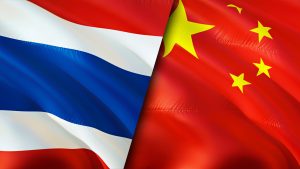Thai Prime Minister Srettha Thavisin arrived in China yesterday for his first official visit to the country, hoping to solicit a fresh wave of Chinese investment that can help support the country’s green transition and high-tech industries.
During the four-day visit, Nikkei Asia reported that Srettha will pay a courtesy call to President Xi Jinping and hold meetings with Premier Li Qiang and Zhao Leji, chairman of the Standing Committee of the National People’s Congress.
Crucially, Srettha arrived in Beijing with a large private sector delegation in tow, signifying the economic focus of the visit. According to the Thai Ministry of Foreign Affairs, the Thai leader “will also have discussions with Chinese business executives to explore further collaboration in trade and investment between Thailand and China.”
Srettha is one of several Southeast Asian leaders – among them Indonesian President Joko Widodo and Cambodian Prime Minister Hun Manet – who are in Beijing this week to attend the two-day Belt and Road Forum.
Government spokesman Chai Wacharonke said that the Thai prime minister would attend the Forum, where he “will take an opportunity to boost the confidence of investors from both China and other countries in Thailand’s economic connectivity, digital infrastructure, and sustainable development,” the Bangkok Post reported.
The economic focus is only to be expected given Srettha’s priorities. A former property tycoon who was appointed as a compromise prime ministerial candidate after the progressive Move Forward Party was unable to form a government after May’s general election, Srettha has pegged his political hopes, and that of his Pheu Thai Party, on a revival of Thailand’s economy. ” Thailand is open for business … we want to invite more foreign investors,” he told reporters while in the United States for the U.N. General Assembly last month.
Since taking office early last month, he has announced a bold stimulus plan in which the government will hand out 10,000 baht (around $275) to every Thai citizen, at a total cost of some 560 billion baht (around $15.8 billion). He has also pledged to reduce electricity fees and diesel prices and has introduced a three-year debt relief program for farmers.
This has proceeded alongside steps to boost tourism and attract more foreign investment. While in the U.S., the Thai leader met with executives from Microsoft, Google, Estee Lauder, and Goldman Sachs in an effort to convince the companies to invest in Thailand. He also held a video call with Tesla boss Elon Musk to discuss the electric vehicle (EV) industry.
Economic cooperation and investment were also high on the agenda during Srettha’s visits last week to Hong Kong, Brunei, Malaysia, and Singapore. After meeting with Malaysian Prime Minister Anwar Ibrahim, Srettha announced that Malaysia’s national carmaker Proton and its Chinese partner Geely are considering setting up an EV manufacturing plant in Thailand. Closing out his tour in Singapore, he and Singapore’s Prime Minister Lee Hsien Loong pledged to explore ways to enhance bilateral cooperation in renewable energy and the digital economy.
Compared to these nations, China plays an outsized role in Thailand’s economy. It plays an important role in trade, accounting for 18.1 percent of Thailand’s exports and 14.4 percent of its imports. It is also a key source of investment and foreign tourist arrivals, which have yet to recover from the devastation of the COVID-19 pandemic. Chinese arrivals in particular are lagging far behind where they were in 2019, the last full year before the pandemic, when the country welcomed around 11 million visitors from China, around 28 percent of the total. Srettha’s government has set a goal of attracting 5 million Chinese tourists in 2023, and has temporarily waived tourist visa requirements for visitors from China.
While in Beijing, Srettha said that he would also discuss a possible solution to the problems involving Thailand’s long-delayed purchase of a Yuan-class submarine from China. The deal was brokered in 2017, but has been held up since Germany’s Motor and Turbine Union company announced that it could not supply its cutting-edge MTU396 diesel engines to the Chinese firm for installation in the Thai submarine due to a European Union arms embargo on China.
The sub was originally due to be delivered to Thailand last month, but considering uncertainty over the propulsion system – China has proposed a Chinese-made alternative – has pushed delivery back to April 2024.
“I don’t want to offer any hope because the matter is delicate and requires good management. But I insist a clear solution is needed. I will try to hold talks and find a solution acceptable to all sides,” Srettha said yesterday, according to the Bangkok Post. “If the submarine is to be purchased, it must be fully functional.”
Whether or not this week’s visit to Beijing yields immediate benefits, the Thai agenda for the visit suggests that good relations with China are centrally important to the current Thai government’s political fortunes. As such, we can expect to see relations continue on the steady upward trajectory of the past two decades.

































